Table Of Contents
In this complete guide, you’ll discover how to get significant results from Enterprise SEO.
Yes, it can work for your business and website if you do it the right way.
This explains why 45% of enterprise-level companies invest more than $20,000 each month to optimize search performance, according to an exclusive study conducted by BuzzSumo and 240 other industry experts.
The results of ranking in Google’s first page can be tempting to big business owners, CEOs, and top-level managers.
Imagine how excited Jeff Bezos was when he finally decided to do SEO after he watched a family member search for books on Google instead of navigating straight to Amazon (which Jeff thought was the go-to place for everyone on the web).
Just like Amazon, Dropbox, Forbes, HubSpot, Shopify, and so on, that are already dominating the search results in their respective industries and multiplying their revenue year over year, if you want to see the same results, you need a full-suite SEO or Enterprise SEO.
If you own a website, you’ve probably heard about SEO before. But what about enterprise SEO?
You might be asking: what do you mean by that? But worry not, I’ll get to it in a moment. The first thing you need to know is that enterprise SEO is not for every business.
However, if you run a business big enough to implement enterprise SEO, then it’s vital you get all the details you need to win in the organic search results.
Not doing so would mean you’re losing organic traffic and potential customers.
What is Enterprise SEO?
As its name implies, enterprise SEO is a form of search engine optimization practice for websites with a lot of pages, with different languages, and serve many countries.
For this type of SEO require, you need to properly plan, execute, and constantly improve your campaigns. It’s never a set-and-forget practice.

In such a situation, there’s a level of complexity that’s absent if you only run a small blog or you’re a small business that’s just getting started with digital marketing.
For instance, if you run or own a big business, then you need to market your business and products in many locations.
That means you need to create content to appeal to different people who might have different needs from your products.
You also need to track your search performance in all these locations. It’s almost impossible for a single person to do this work effectively. And that’s why you need enterprise SEO.
How Enterprise SEO Differs From Regular SEO?
SEO is a popular term. Enterprise SEO? Not so popular.
Let’s get this out of the way: enterprise SEO and regular SEO are done to achieve the same end goal:
To improve your presence in search engines and attract more customers.

Some differences between enterprise SEO and regular SEO are:
i). Complexity: Enterprise SEO is more complex than regular SEO as you need to track so many metrics for different versions of your website.
ii). Scale: Enterprise SEO is on a larger scale than regular SEO. You’re managing more pages and you have to create more content. Likewise, you’re managing more languages and presence in more countries.
iii). Team size: For a website’s regular SEO, a single individual could do all the work. But enterprise SEO requires a team. Each member of the team has a specific duty to carry out to improve the website’s SEO performance.
Enterprise SEO Strategy
One of the major challenges with enterprise SEO is being able to adapt to changes fast. What happens when Google rolls out an update which affects hundreds or thousands of pages on your website?
For instance, when Google released the E-A-T (Expertise, Authoritativeness, and Trustworthiness) update also called the medic update, it affected many health websites.

How do you adapt fast in a situation like this to prevent the possible drop in organic traffic?
The interesting reality about enterprise SEO is that any tiny change in a metric’s percentage can lead to thousands in real values.
For instance, a single percentage drop could mean thousands of drop in visitors.
That’s why you need an enterprise SEO strategy.
But that’s not all. You also need a strategy that makes you ready when there’s an inevitable change in search engines’ algorithms.
What are some strategies you need to improve enterprise SEO for your big business?
1. Provide Adequate Training for Your Team
A lot of changes are going on presently in the search. One striking one is that more than 2.3 million searches happen on Google each minute.
Trust me, no matter the size of your SEO team, state-of-the-art tools, or experience you have, it’s impossible to keep up with all of this.
However, if your team can unearth a tiny fraction of 2.3 million new searches and optimize your pages for them, you’ll be generating a lot of organic traffic quickly — even before your competitors realize it.
Enterprise SEO usually requires having a team in charge. Unlike SEO for small websites, you need a team with individuals taking on various tasks important to your search ranking.
To get the best possible results, it’s vital that your team members get adequate training regularly.
This is to update them on new trends and expectations from their tasks. In the SEO world, things change regularly and your team needs to be aware of all these changes.
What does the new Google update mean for your company’s SEO strategy? How does it affect a team member’s work? These and more are some of the considerations that make regular training a necessity.
Through this training, your team will be armed with the intricacies of SEO process and how to get better results.
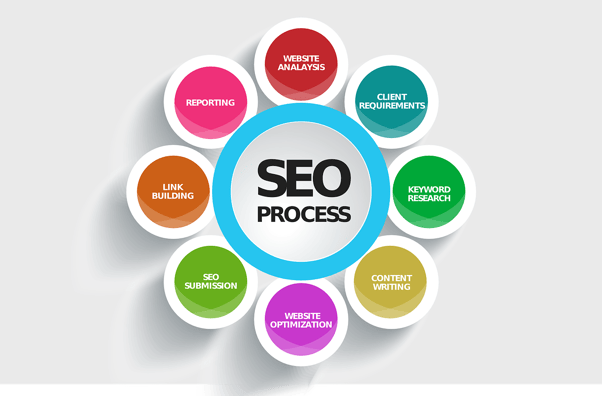
This training could be done by your in-house specialists for their team members. You can also bring in external experts to come to train your team on the latest trends and practice in search engine optimization.
Both methods have their advantages and disadvantages. In-house experts understand your company culture and are able to tailor their strategies to adapt to it.
However, in-house experts may be restricted as they have little knowledge of how other companies go about enterprise SEO.
For external experts, they have more experience as a result of working for many companies and they can bring fresh insights to your SEO strategy.
The con here is that they might be costly and they don’t understand your company culture.
Generally, to make your training more efficient, you should use both in-house and external consultants. Your in-house experts can conduct regular training while experts can come in to train your team quarterly or twice a year.
2. Staff Must Understand Their Roles
For enterprise SEO, there are many tasks that are delegated among your team members.
For instance, you’ll have people in charge of content creation, link building, website design, social media, etc.
Every member of your enterprise SEO team must understand what they have to do and how to go about it to achieve the required results.
3. Encourage collaboration between departments
Every worker in your team is working to achieve the same big aim:
“To improve your company’s search rankings, organic traffic, number of leads, and customers.”
Whether someone designs your websites or create content, they’re all working towards this aim. That’s why collaboration is vital in your enterprise SEO plan.

But it will be difficult to achieve this aim without proper collaboration. At some points, two or more individuals working in different aspects will have to work together on some tasks.
There must be a system in place to make collaboration easier. This starts with communication between various departments.
A clear line of communication would make it easier for different departments to collaborate on the same tasks.
In cases where you need to bring in external SEO consultants, there must be a proper collaboration between the external expert and your in-house team to get the important messages across.
4. Submit XML Sitemap
The first step to showing up in search engines is to get your content indexed on the search engine.
When you have thousands of pages on your website, how do you ensure they’re all indexed on your website?
The first step is to have a comprehensive sitemap and submit it to search engines. You can get experts in-house to create one or employ an external expert.
After doing this, visit your Google Search Console and click on sitemaps.
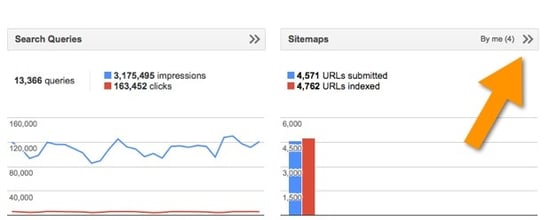
Click on the arrow and on the “Add/test sitemap” button.
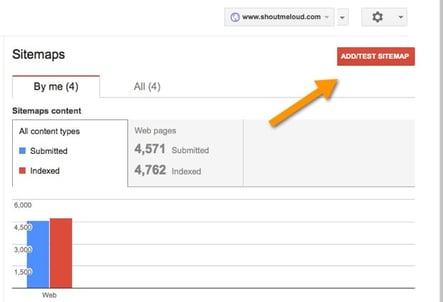
Type your sitemap address and submit your sitemap.
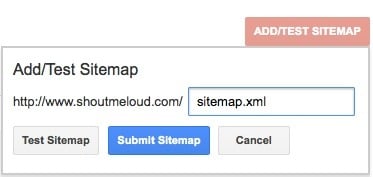
One way you can check the number of your indexed pages on Google is to use the site search operator. Enter the search term “site:yourwebsite.com” and search.

This will show you the number of results from your website. This is an approximate number of your indexed pages. Although this is not perfectly accurate, it will give you an idea of the number of your website pages indexed.
You can compare this number to the number of pages on your website.
5. Build Links from Authoritative Websites
If you run a large website, you probably have a high-level of authority. One of the reasons for this is the quality backlinks you’ve built over the years.
But link building is not a one-time activity. It’s a continuous activity. Whether you have 1,000 backlinks or 100,000 backlinks, you must continue to build backlinks to your new pages as you create them.
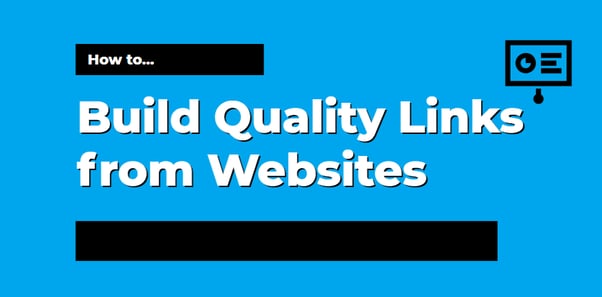
Another advantage to your side is that it’s easier to build editorial backlinks as an enterprise.
For instance, when your pages show up in search results for important keywords, your website becomes more popular and you gain more backlinks.
Other ways you can gain backlinks are:
i). Guest posting: The CEO or a top-level executive can guest blog on authoritative websites, especially those in your industry.
This is an example of John Rampton on Entrepreneur. He links back to his website from his author bio.

ii). Press releases: Do you have a new product or added a new feature to your service?
You can make press releases to inform the public about your product. Another benefit you gain through this is a backlink to your website. See an example below:

6. Engage in Internal Linking
When you operate a large site, a huge portion of your link juice goes to your homepage. Likewise, it’s common for your old posts to disappear into oblivion.
One way to ensure that your old posts remain relevant and search bots continue to access them regularly is through internal linking.
While producing content, you should always link to other posts on your website to make reference to a point.
As an example, here’s an excerpt from our recent post where we linked to our previous post on lead generation:
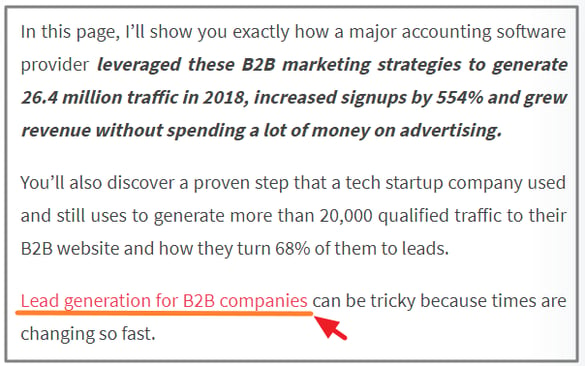
Apart from making your page easier to access for search engine bots, it also provides better value for your visitors. This leads to a higher engagement from visitors and higher rankings for your pages.
7. Produce More Quality Content
No amount of content is too much.
Whether you run a single page or millions of pages, content is still a vital part of ranking high on search engines. The difference here is that you’re producing content on a large scale.
This can pose a challenge to ensure quality content on thousands of your website pages. Whether it’s creating new engaging content or updating your already-indexed pages, it’s quite difficult. That’s why 60% of B2B marketers struggle with it, according to the Content Marketing Institute.
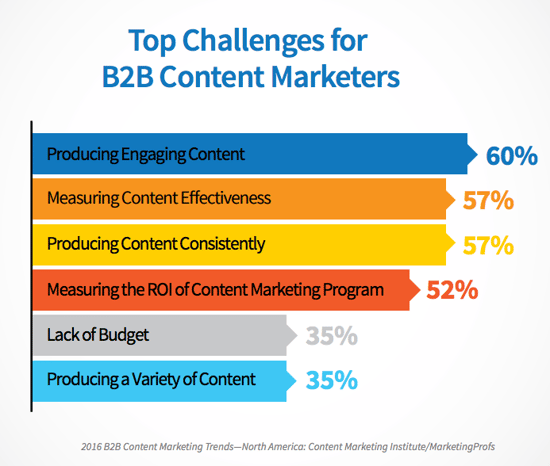
Another challenge you might face could be when there’s a major Google update.
It could necessitate making changes to a large number of your website pages. There are usually 2 ways to do this:
- Get a poor writer to make changes to your content.
- Hire a competent writer to produce great content for you.
Of course, the latter option will cost more. But it’ll also give you a better chance of ranking for your desired keywords.
Another point you need to note is that quality content depends on your visitors’ expectation. So “quality” is completely relative to so many people.
The question to ask yourself is, “does my content answer the user’s question clearly?” If it does, then it’s good content. Otherwise, you might want to improve the content or create a new version from scratch.
8. Produce Long-form Content Consistently
The general rule is that you should produce long-form content for your website pages. Most bloggers know this.
This type of content has a higher likelihood of ranking high for your target keywords. Because they tend to acquire the signals that show Google a post is valuable.
For instance, a study by Moz and BuzzSumo found that long-form posts tend to have more backlinks and social shares than short ones. If you have a blog on your website, then you should have long-form content on it.
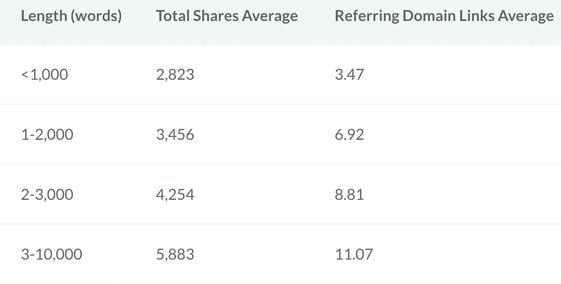
However, it may be unnecessary to have 3,000 words on your product description page. Despite that, some product description pages offer more value to potential customers.
How do you define quality content for a product description page or a service page?
A quality product or service page provides all the necessary details a potential customer needs to make their decision about buying your product or subscribing to your service.
Check out the Google search quality evaluator guideline for more details about creating quality content.
9. Repurpose Your Content
Written content is the most popular form of content. But the reality of having only written content on your website is that not every potential customer will engage with it.
A study by Nielsen Norman Group found that visitors to your page only read 20 to 28% of the words.

You can repurpose your content to increase user engagement. Some formats you should use are:
i). Infographics: This involves the use of images to explain a difficult concept. It’s easier for your visitors to understand and attracts more social shares.
Likewise, infographics attract more backlinks to your website which can improve your search rank.
If you want a professional infographic designed, you can hire graphic designers on Dribbble or do it yourself using Piktochart.

ii). Videos: If you produce content on how to use your product or service, then you should make videos.
Your customers can follow your video instructions to help them use your products better. One example of this is Zappos. The website provides videos on their product pages to explain shoes better.

iii). Podcasts: This is an audio format of your content. For people who want to listen to your content while doing other things, a podcast provides this opportunity.
A podcast is especially applicable to content that shows your expertise on a subject or for a tutorial.
10. Avoid Duplicate Content
Duplicate content pages can be a major SEO issue. Raven Tools crawled 200 million pages between 2013 and 2015 and found that 29% of them are duplicate content.
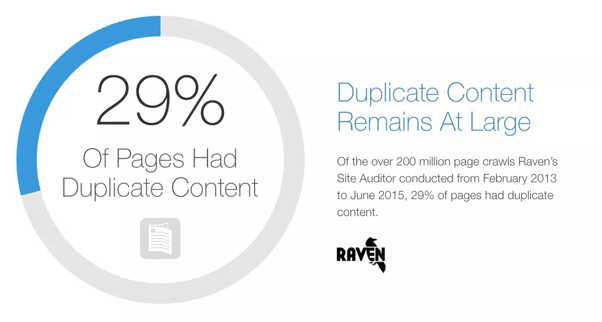
Here’s where it gets risky:
If you have many pages on your website, there’s a risk of duplicate content. In fact, it’s one of the major challenges you can face if you have many product pages.
This is because your product can appear in different categories when your visitors apply filters. Without a proper website structure and canonization, it can cause a major problem for ranking your product pages.
Google’s former head of Web Spam estimates that 25 to 30% of the web is made up of duplicate content.
For instance, a blue female bag could show up when a potential customer applies a filter for the product bags. It will also show up for female products or blue color.
The issue is that all these 3 ways to access this bag will have different URLs. Meanwhile, they point to the same page. What are the possible solutions to the duplicate content issue? Some of them are:
-
Use canonical tags
-
Use noindex tags
-
Perform 301 redirects
-
Use hreflang to differentiate languages
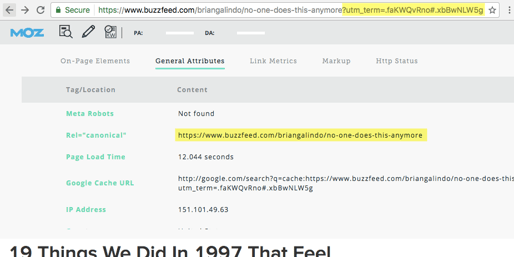
11. Have a Long-term Plan
Let’s be frank, the internet is kind of overpopulated right now. And people produce more content daily. Even for small blogs, it takes around 3 months to start seeing obvious results.
However, for enterprise SEO, it may take about 6 to 12 months before you start seeing obvious results. Therefore, you need to keep in mind that this type of SEO is for the long haul.

Also, when an SEO expert or agency promises quick rankings and traffic on Google, you should be skeptical. Any form of SEO takes time. There’s no shortcut whatsoever.
To have a long-term plan, you need to have various targets at intervals. This could be your goals:
- After 3 months.
- After 6 months.
- After 12 months.
You can also review these targets depending on how you perform during a particular interval.
12. Conduct a Thorough SEO Audit
If you want to get the best results from your enterprise SEO campaigns, then you need to conduct an SEO audit. You’d access all the data and opportunities to improve your search visibility.
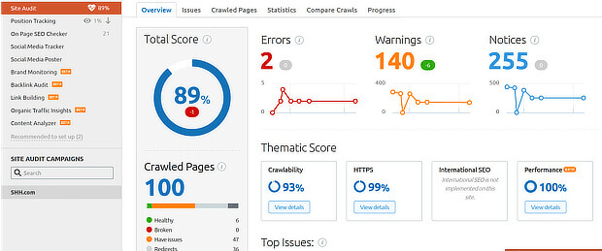
Whether for an external expert or in-house team, they need to see your current performance on search engines.
During an SEO audit, you’ll see what you’re doing right and where you can improve. This will also affect your targets. If there are minor issues on your website, then they’ll be easier to fix.
Generally, an SEO audit is a vital activity that you need to understand what needs to be done to improve an enterprise website performance.
13. Track the Right Metrics
You’re probably aware of the term “vanity metrics.” During your enterprise SEO process, there are many metrics to measure.
But the question you must always ask is: what are the important metrics for my business? The truth is that an important metric for a particular campaign may be different from that of another campaign.
For example, organic traffic will be an important metric if you’re on a campaign to improve your brand awareness.
However, it may not be so important if you want to have more sales. Your conversion rate would be an important metric in this case.
Having said that, some metrics you can track for your SEO are:
i). Impressions: This is the number of people who see your page on the search results page.
ii). Organic Traffic: This is the number of visits to your website from search engines. Although many people are quick to label traffic as a vanity metric, you must understand that all other metrics rely on site traffic. Without organic traffic, there’s no way you’re getting customers from search engines.
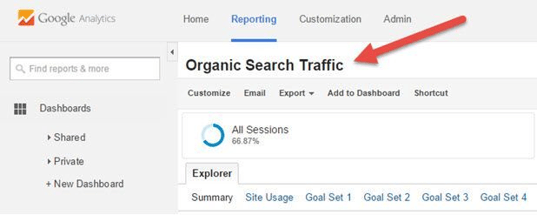
iii). Click-through rate (CTR): This is the number of people who see your website link on the search results page compared to the number of those who click-through.
iv). Search results page positions: These are the positions your pages occupy for some important keywords. Check keywords positions on your Google Search Console account.
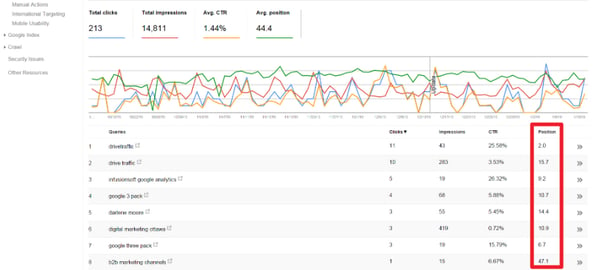
v). Ranking keywords: These are the keywords your pages rank for. You must monitor this as you want to rank for keywords that your customers are likely to use.
14. Analyze Your Results
How do differentiate the experts from the amateurs? One way of doing that is how they analyze their numbers. Some common questions you can ask to analyze your results effectively are:
-
Does an increase in organic traffic means you’re doing a great job?
-
Are you increasing organic traffic to important pages?
-
Has your click-through rate decreased despite an increase in organic traffic?
-
What’s the number of your pages ranking on Google’s first page?
There are more questions you can have and asking the right questions will lead you to find the right answers and results.
15. Create Detailed Reports
After analyzing your results, you need to create reports to show the work you’ve done during a period of time and the consequent results.
Benefits of Enterprise SEO
If you run an enterprise, what are the possible benefits you can gain from enterprise SEO? Check out some of them below:
i). Better organization
One of the major issues you can face with your big website is that it becomes difficult to keep every part of your website organized.
However, enterprise SEO eliminates this issue and help you to organize your website activities.
ii). Local marketing becomes easier
Having many branches in your enterprise means you have to rank locally to attract local customers. This is easier said than done.
But with enterprise SEO, you can manage your local searches at different locations on the same platform. You can also see your performance at these locations.
iii). Build more authority
Enterprise SEO helps you to use your website’s existing authority and build upon it to increase your authority.
With enterprise SEO, you’re not just building your website from the ground, you’re optimizing your large site to improve its performance. In the end, your pages and domain authority score will increase as well.
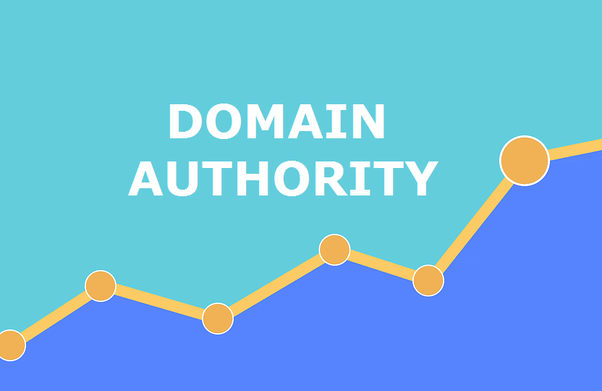
iv). Attract a new audience
By optimizing your website, you gain a new audience through your improved search rankings.
Best Enterprise SEO Tools
Doing enterprise SEO can be an impossible task. In fact, you need tools to get all the important metrics you need to improve your website’s SEO.
Fortunately, there are enterprise SEO tools that help you with different aspects of optimizing your website to attract more customers from search engines. These tools help you with tasks like:
-
Tracking your keywords
-
Creating the right content
-
Competitor analysis
-
Reporting
1). BrightEdge
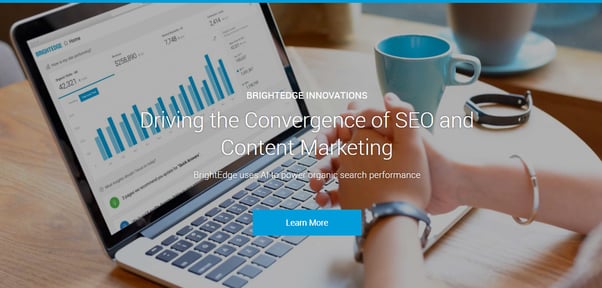
BrightEdge uses artificial intelligence to improve your search visibility. BrightEdge offers you tools to improve the following aspects of your website:
-
Search
-
Content
-
Social
-
Local
-
Mobile
The ContentIQ tool helps you to audit your website content to find opportunities to improve your content.
It will also help you find site errors and show you the potential benefits of fixing those errors. You can even customize your audit to see only the types of errors you want to see.
The data cube tool helps you to find keyword opportunities that can drive more organic traffic to your website. You can also see keywords you’re ranking for already.
For an enterprise website with a huge amount of content, it’s possible to rank for thousands of keywords. Of course, not all these keywords will bring profitable traffic to your website.
BrightEdge can help you find the keywords that bring profitable traffic to your website. With this knowledge, you can create more content around these keywords to gain more traffic.
If your enterprise has many branches, then local SEO is critical to attracting customers in their locality. BrightEdge has a tool called HyperLocal that helps you to rank higher for local searches.
Since the same keyword can yield different results in different locations, knowing your rank in different cities will inform your strategy. HyperLocal provides local search results in 72,000 cities.
The tool also helps you to track your search performance for local keywords in these cities. You can also see when your local listings appear on local map packs.
Who are your competitors in your immediate environment? You can see their search performance and target their high-performing keywords.
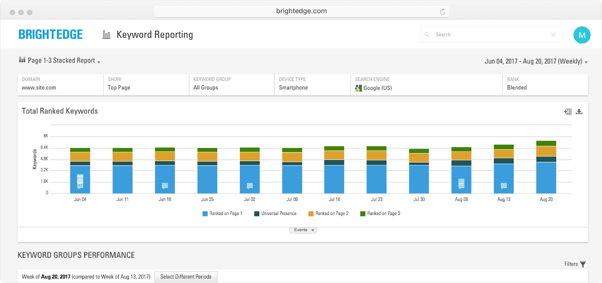
The keyword reporting tool gives you more insights about the keywords your website currently ranks for. It provides keywords that are more likely to bring profit to your website.
You can also see important keywords your website is not ranking for. This is an opportunity to create content to pursue these opportunities.
The site report tool provides details like the number of indexed pages on your website. This helps you to easily detect if some of your pages are not yet indexed on Google’s database.
Some cons you can experience with BrightEdge are the cost and complexity. The issue here is that these cons apply to most enterprise SEO platforms.
Due to this complexity, you may have to contact customer support to carry out some edits for you in your account.
2). Conductor
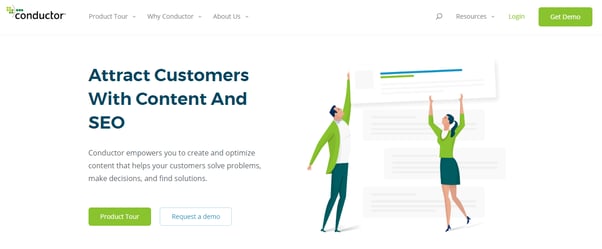
This is an enterprise SEO tool that helps you to produce content optimized for search engines. With this tool, you can see where your content strategy is succeeding and where it’s performing poorly.
For instance, you can find the pieces of content that are generating high-quality traffic to your website. Furthermore, you’ll get performance insights into your content across various devices.
You can get more insights about your customers. When you understand where your customers and coming from and their needs, it’s easier to create content that is likely to attract them.
By tracking audience trends, you can adapt your content as your audience needs change. You’ll also be able to target your audience better — since a whopping 39% of B2B marketers don’t do this.
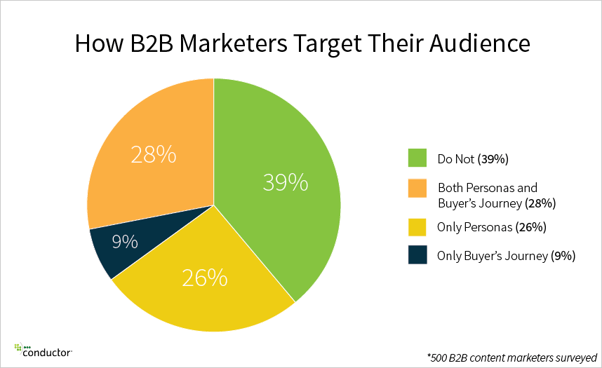
Added to these, you can track the keywords you rank for. Likewise, you can also track your market share by location, device, results type, and other metrics.
Conductor provides SEO recommendations to help you improve your website’s SEO.
You’ll also get information about technical site error and how to quickly fix them.
Apart from making recommendations, Conductor helps you to measure your website’s SEO performance. This way, you can see the effect of your actions. You can also see how your content performs by page, persona, or product.
With complex tools like this, you might run into issues and need help from customer support.
A vital feature you need is been able to report your processes and results. With this tool, you can present the metrics your boss or stakeholders want to see.
Of course, one of the cons, especially if you run a small business, is that the Conductor tool is quite expensive. If you don’t run an enterprise, it may be too costly.
Another con is that there’s no link building tool. It’s also a complex platform and you need the training to use the tool effectively.
3). Searchmetrics
This is an SEO and content marketing platform for enterprises. It provides analysis that can help you to improve your content for better search rankings.
Searchmetrics also has tools you can use to track keywords you currently rank for.
The tool can provide 100,000 rankings per report. It can also provide the historic keyword ranking for the past 2 years.
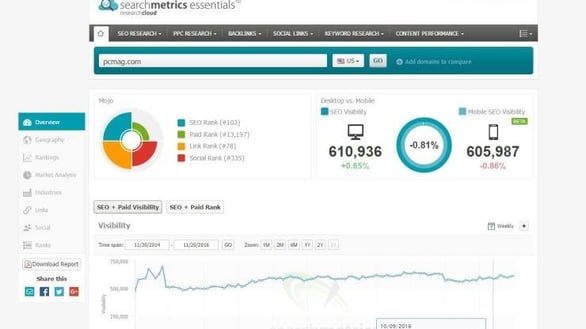
Searchmetrics provides tools that help you improve your mobile and local visibility on search engines. You also get PPC insights which you can apply to your SEO strategy.
You can also carry out competitive analysis to see the keywords competitors are ranking for.
4). Linkdex
Linkdex is one of the cheapest enterprise SEO platforms. That doesn’t make it inferior though. It provides many tools to help you improve your enterprise website.
One of them is the share of search tool that shows you your organic traffic in comparison with your competitors.
The Content 360 tool shows you pages with SEO issues and also the number of keywords a page is ranking for. This is useful to track long-tail keyword variations of your target keyword for a page.
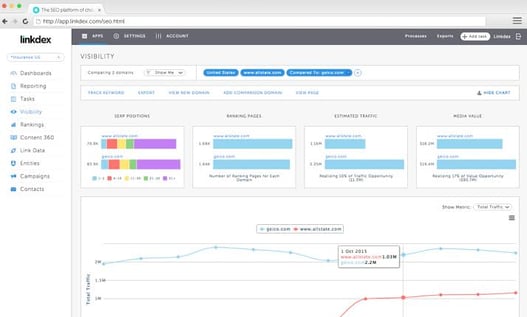
Another advantage of Linkdex is that it integrates with Google Analytics and Google Search Console.
This can bring your website information to a single platform. Linkdex also has content strategy tools that can help you write the best post optimized for search.
You can also carry out competitive analysis to find where your competitors gain their backlinks. Through this, you can also find opportunities to build more backlinks.
Enterprise SEO: Steps Summarized
This is a summary of how to plan and execute enterprise SEO effectively. Basically, you need to follow these simple steps:
-
Carry out an SEO audit on your website.
-
Use an enterprise SEO tool.
-
Update your content to target the best performing keywords.
-
Track your search performance.
-
Create your reports.
There are other steps that could be included here depending on whether you use an in-house team or employ external consultants.
Enterprise SEO Examples and Case Studies
Many enterprises use enterprise SEO to improve their visibility on search engines. And this has led to desirable results for these businesses.
For example, SurveyMonkey was able to increase its organic search visibility by implementing a thorough enterprise SEO plan.
Another large company, Tipalti, developed a keyword strategy that grew their search results using this tool.
Through the use of internal links and other link placement strategies, Trophy Central, a large eCommerce site, got a Google top 10 position for 9 search terms.
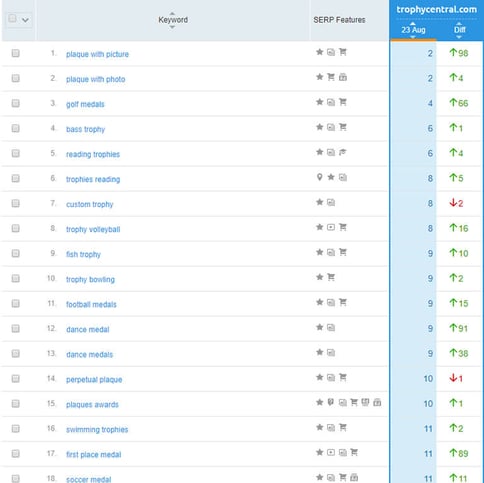
Final thoughts
If you run an enterprise-size business, then it’s a no-brainer that you implement enterprise SEO to improve your chances of showing up in Google top 10 results pages.
Of course you can do keywords research, link building, competitive analysis, and content creation in-house.
However, if you don’t like the technicalities involved in enterprise SEO, it’s important to consult with industry experts that can help you train your digital marketing staff or develop a winning enterprise SEO strategy for you.
If you choose the second option,OneIMS SEO Services could be the right fit for your business’ website Get a free growth strategy session today.





